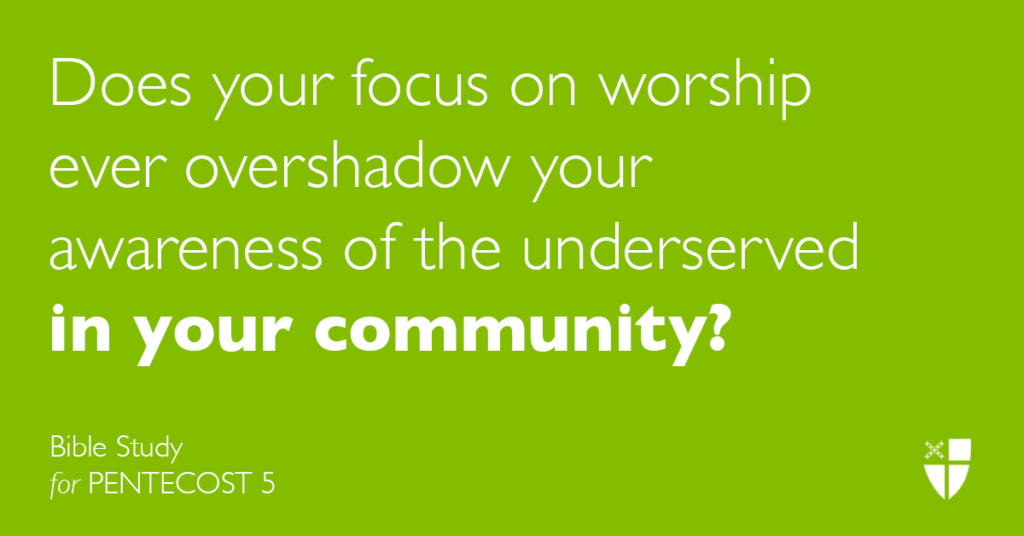This page is available in: Español
Bible Study: Proper 10 (C) – 2019
July 14, 2019
Amos 7:7-17

Amos sure doesn’t make God seem very friendly, does he? According to his prophecy, those who speak against God or against God’s true prophets won’t fare so well. They’ll “die by the sword,” and their relatives will see disgrace and dishonor. If we are taught that God is loving and merciful, how then do we make sense of this depiction of God?
The way God is depicted here isn’t meant to give us a literal description of God as much as it is meant to communicate that God stands with the oppressed. Amos was called by God and given God’s message of justice and compassion. God does not desire ornate rituals and burnt offerings from worshipers who ignore the poor and those in need. Perfect worship is meaningless if you’re not serving your neighbor out of love. Don’t worry; God won’t condemn you to hell for participating in good liturgy—God just wants to you feed the hungry, too!
- Where else in the Bible does God communicate his compassion for the oppressed?
- Does your focus on worship ever overshadow your awareness of the underserved in your community? How is God calling you to serve them?
Psalm 82
This psalm seems to place Israel’s God among a council of gods. Like Amos’ portrayal of God, that doesn’t make sense. Not only were the ancient Israelites a monotheistic people, but monotheism was a crucial part of their identity. It set them apart from other ancient near-eastern cultures. What are we to make of this?
As with our passage from Amos, this imagery is less about a literal depiction of God and more about what God would have us know. As God is portrayed here, he is not happy with the judgments of the others on the council, who side with the wicked. God desires justice for the weak, the orphan, and the poor. Any judgment that does not consider the needs of the disadvantaged is unjust. God’s message is clear: you can do better! It’s not a guilt trip, it’s just honest. As you pray this psalm, remember that God calls each of us to interpret the needs of the poor, the friendless, and the needy.
- How does our wider culture side with the wicked? How does God make it clear that he rejects that? What can the Church do to make God’s judgments a reality on earth?
Colossians 1:1-14
The author of this letter (scholars dispute whether it is authentically Pauline) greets the faithful of Colossae with support and encouragement. The writer recounts knowledge of the Colossians’ hope and ardent zeal for the gospel as they have received it and expresses support in the form of prayers and blessing.
I must admit, sometimes I wonder why epistolary salutations like this are included in the lectionary cycle. They don’t appear to include any earth-shattering revelations or particularly wise counsel. Perhaps the author’s encouragement is worth more than that. Taking their cue from the larger culture, church folk often forget to support each other. Hearing the words of this ancient epistle reminds us all of one of our most important jobs: lifting one another up in Jesus’ name.
- Think about how it feels to receive kind words in a difficult time. How can you show that same support to your siblings in Christ?
- A bit of recognition can have a big impact in someone’s life. Who in your community might be in particular need of encouragement? How might you be a source of comfort to them?
Luke 10:25-37
I think it’s safe to say that most Christians could tell an accurate version of this familiar story by heart. Although it may seem like a simple story first taught to us at a young age, its lessons are manifold. Accordingly, it can be hard to distill into one simple lesson. I’d venture to guess that precisely because the story is so familiar, each person who recounts it emphasizes a different component and gleans a different moral. This is the genius of Jesus’ parables; each one is much more than a simple anecdote or allegory. Quite the contrary, Jesus’ parables are vivid and arresting, meant to provoke us into active reflection on our faith.
- What is your takeaway from the parable of the Good Samaritan?
- Jesus tells the story as an answer to the question, “Who is my neighbor?” What do you think the answer is? Is there more than one?
This page is available in: Español
Don’t forget to subscribe to the Sermons That Work podcast to hear this sermon and more on your favorite podcasting app! Recordings are released the Thursday before each liturgical date.
Receive Free Weekly Sermons That Work Resources!
This page is available in: Español


